Featured Articles
Jermell Charlo Is Ready For The Next Step
 Jermell Charlo (18-0, 9 KOs) might just be the most overlooked prizefighter in boxing’s deepest and most talented division. The junior middleweight from Houston believes he was on the cusp of securing a world title shot against IBF belt holder Cornelius Bundrage, who,Charlo says, pulled out of negotiations to seek a fight against someone else instead.
Jermell Charlo (18-0, 9 KOs) might just be the most overlooked prizefighter in boxing’s deepest and most talented division. The junior middleweight from Houston believes he was on the cusp of securing a world title shot against IBF belt holder Cornelius Bundrage, who,Charlo says, pulled out of negotiations to seek a fight against someone else instead.
“We were 95% done with the Bundrage fight [being made], and then all of a sudden he turned it down,” Charlo said. “I would’ve ended his career. “
The 22-year-old Charlo somehow pulls off being likeable but supremely confident at the same time, an interestingly endearing quality.
He says he’s anxious for big opportunities, like a fight against Bundrage would’ve been, but he also has a sharp enough business sense to know it’s not so easy. He told me he understood from Bundrage’s perspective why the fight was turned down, and that, at Bundrage’s age (39), the titlist should probably focus on getting a fight against a less risky opponent with a bigger name.
“A loss to a young guy like me would’ve ended it,” he said.
Charlo is trained by top flight cornerman Ronnie Shields. The two have had a relationship since Charlo was just eight years old, meeting at the world famous Savannah boxing gym, where some of the best fighters in Houston have made names for themselves, including former world lightweight champion Juan Diaz.
Charlo trained out of Savannah for his entire thirteen-year boxing career until just a few months ago, when Shields moved his stable of fighters over to the Plex fitness center.
So far, Charlo thinks the move has paid off. He told me the focus on cutting edge strength and agility training at Plex is helping him get bigger, faster and stronger, and that he is maturing as a fighter because of it.
Lots of professional athletes use Plex fitness programs to help them get better in whatever they do. They’ve helped train the elite of the elite, including World Series winners, Super Bowl champions and Olympic gold medalists.
Now, Shields is utilizing the facility for boxing, blending old school boxing training techniques he helped make famous at Savannah with new school training regimens designed to make athletes better than they’ve ever been.
Boxing is a sport like no other, though, and Charlo is the first to recognize that being supremely fit is only part of the battle
“Boxing is a mental thing,” he said.
Mental preparation is vital in boxing, and there is probably no more important contributory relationship to it in sports than the one between fighter and trainer. Charlo is ecstatic to be working with Shields, someone he has long admired in both boxing and life.
“Working with Ronnie Shields is great,” he said. “I always looked up to him and wanted him to be my trainer. He’s who we look up to and ask questions. Anything comes up outside of boxing, and you can call Ronnie Shields. Ronnie is the man. ”
Shields’ bevy of fighters includes not only Charlo, but also 154 pound stablemate Erislandy Lara and undefeated 168 pound prospect Edwin Rodriguez.
“We all have the same mission,” Charlo asserted. “To be a world champion.”
I was curious what it was like for Charlo to train with someone like Erislandy Lara, who is already one of the most feared and respected names in the sport of boxing and who also fights in the same weight division. Charlo said he was glad to be working out with such a great fighter, and that both of them benefited from the intense sparring sessions.
“Lara is one of my only sparring partners,” he said. “And I’m one of his only sparring partners. The main reason why is because nobody can handle him the way I handle him. Nobody can treat him in the ring the way I do. A lot of people will get in the ring with him and are afraid to hit him, or he’ll just demolish them.”
I asked Charlo what he thought about Lara as a fighter since he had seen so much of him up close.
“He’ll be a world champion,” he assured me.
Charlo told me when he first started working with Lara, he too was filled with awe. He said he looked up to him as a fighter and attributed much of his recent success because of him.
“He’s the reason why I knocked out the last two southpaws I fought,” he said. “It all adds up.”
Still, Charlo told me he’s ready to step up to the elite class of the division, and that being in awe of any particular fighter in the weight class is no longer an option for a fighter coming into his own.
“He’s in my weight class so I have to go in with that mindset.”
In his last two fights, Charlo has shown serious power. He knocked out the hulking Chris Chatman in the third round back in March on the Erik Morales- Danny Garcia undercard, then followed it up with an impressive fifth round stoppage of Dennis Douglin in June.
I asked Charlo if he had been working on knockout power in the gym specifically, or if it was just something that was coming along naturally.
“I’m in there to get the knockout, but that isn’t my main focus,” he said. “My main focus is to win my fight. Regardless of how I win, I’ve got to win the fight.”
Charlo and I talked about the current state of the junior middleweight division. He thinks the winner of November’s Erislandy Lara-Vanes Martirosyan match-up will earn a shot at WBC champion Canelo Alvarez. With those three guys tied up and Miguel Cotto vs. Austin Trout lined up for December, he felt like the odd man out after losing his chance to fight Bundrage.
“It’s been really crazy. That would have been a perfect fight for me. Everybody’s nearly booked. I really want to fight a name.”
Charlo isn’t shy about calling out whomever he wants to fight next, whether it be on twitter or otherwise, and my interview with him was no different.
“I do a lot of calling out. I don’t know if that’s a good or a bad thing, but I have to do what I got to do. I’m getting older myself,” he said.
I asked him who he wanted to fight next with all things considered, and he wasn’t shy about targeting another Texas boxing superstar, junior middleweight James Kirkland.
“I would love to knock the hell out of James Kirkland,” he said. “We’re both in Texas. We’re both at 154. We’ve both got a lot to prove.”
Jermell Charlo is ready for the next step. He’s young, undefeated and hungry for the opportunity to prove himself against the very best in the division. While he competes in what is likely the best division in the sport, he certainly doesn’t seem fazed by it at all. In fact, it seems as if he almost relishes the opportunity.
“I am one of the best fighters. I’m big, I’m solid and I’m still growing.”
You can follow Jermell Charlo on twitter @TwinCharlo. His twin brother, Jermall, is also an undefeated junior middleweight prospect (9-0, 5 KOs) who is scheduled to fight October 26 in Austin, Texas. Follow him @FutureofBoxing.
-

 Featured Articles3 weeks ago
Featured Articles3 weeks agoThomas Hauser’s Literary Notes: Johnny Greaves Tells a Sad Tale
-
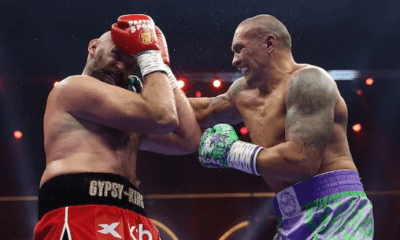
 Featured Articles2 weeks ago
Featured Articles2 weeks agoBoxing Notes and Nuggets from Thomas Hauser
-
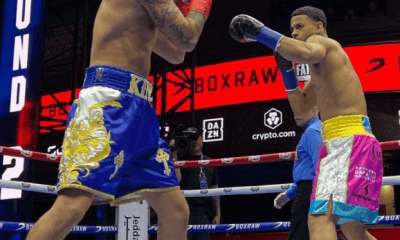
 Featured Articles4 weeks ago
Featured Articles4 weeks agoRolly Romero Upsets Ryan Garcia in the Finale of a Times Square Tripleheader
-
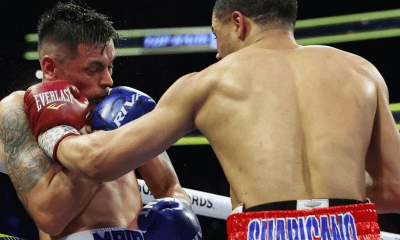
 Featured Articles4 weeks ago
Featured Articles4 weeks agoUndercard Results and Recaps from the Inoue-Cardenas Show in Las Vegas
-
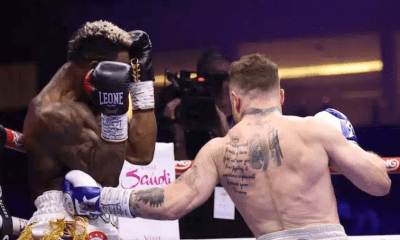
 Featured Articles4 weeks ago
Featured Articles4 weeks agoCanelo Alvarez Upends Dancing Machine William Scull in Saudi Arabia
-
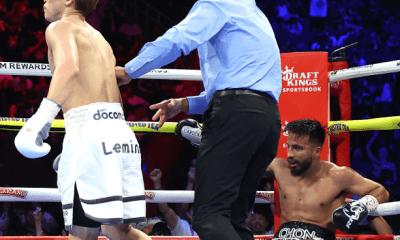
 Featured Articles4 weeks ago
Featured Articles4 weeks agoBombs Away in Las Vegas where Inoue and Espinoza Scored Smashing Triumphs
-
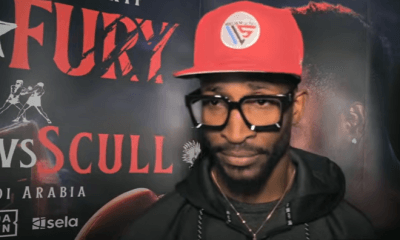
 Featured Articles4 weeks ago
Featured Articles4 weeks agoArne’s Almanac: The Good, the Bad, and the (Mostly) Ugly; a Weekend Boxing Recap and More
-
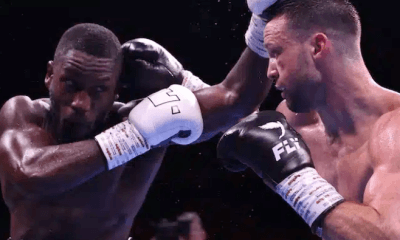
 Featured Articles1 week ago
Featured Articles1 week agoEkow Essuman Upsets Josh Taylor and Moses Itauma Blasts Out Mike Balogun in Glasgow



















